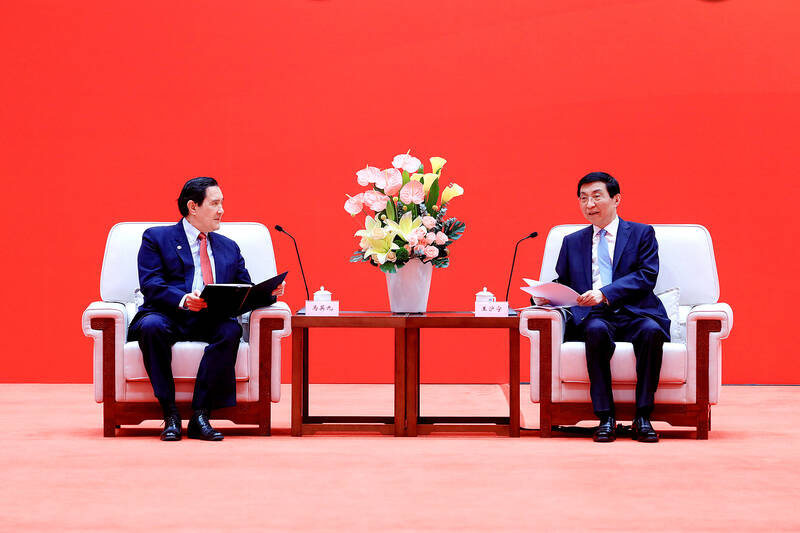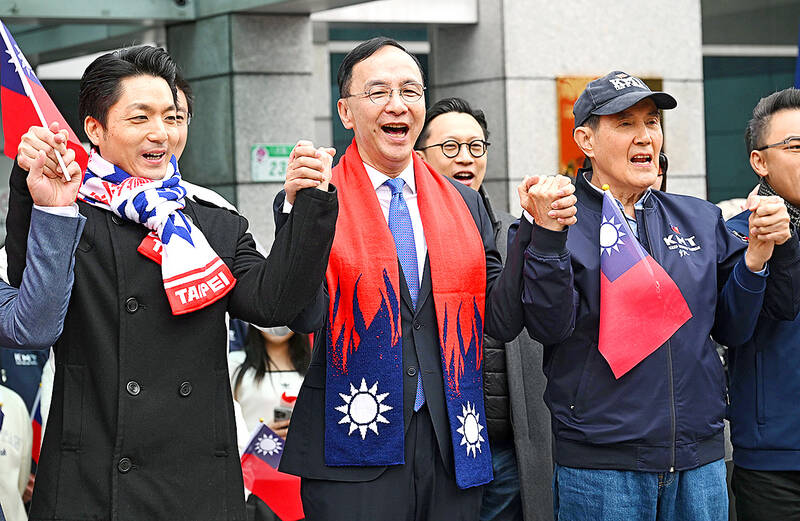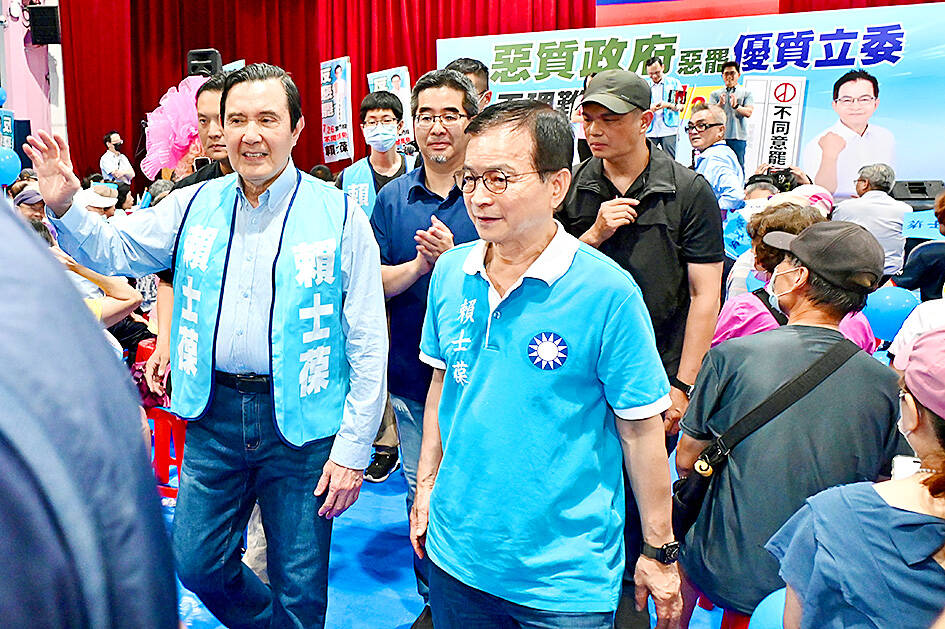At times, it almost seems that former president Ma Ying-jeou (馬英九) is out to sabotage the Chinese Nationalist Party (KMT).
As if on cue, with the recall campaigns against KMT lawmakers in full swing, Ma thought it would be a good time to lead a delegation of students to China and attend the 17th Straits Forum (海峽論壇) and meet with Wang Huning (王滬寧), the Chinese Communist Party (CCP) Politburo member entrusted by Chinese President Xi Jinping (習近平) to be his second in command on Taiwan policy and to run the United Front Work Department (UFWD) in charge of subverting enemies, including Taiwan.
In China, the former president praised Xi for his “diligent efforts” in promoting cross-strait peace, reiterated his firm belief in “peaceful unification,” and claimed that Taiwanese yearn for both sides of the Taiwan Strait to move toward “peace” and “integration.”

Photo courtesy of Ma Ying-jeou Foundation
Ma joined China’s Taiwan Affairs Office (TAO) Director Song Tao (宋濤) at the Straits Forum and in his speech said in a clear dig at President William Lai’s (賴清德) administration: “No political force can suppress or prevent sincere exchanges between people on both sides of the Strait, let alone block the natural feelings of the Chinese people on both sides of the Strait who share the same roots and origins.”
Taiwan’s Mainland Affairs Council’s (MAC) official stance on the Straits Forum is that it “serves as a united front platform used by the CCP to target Taiwan,” and suggested that Ma’s meetings with Chinese officials were “deeply regretful.”
His comments, actions, and reiteration of his support for the “one China” ideology that Taiwan is a province of China was the best gift the recall campaigners could have hoped for.

Photo: Chen Cheng-yu, Taipei Times
Their main campaign theme is that the KMT is too close to the CCP, is actively undermining the government’s efforts to resist Chinese aggression, and that the KMT is not living up to the promises it has made to defend Taiwan.
Similarly, just days before the general elections last year, Ma gave an interview with Deutsche Welle reiterating his beliefs and hopes for unification, decrying efforts to boost the military and saying Taiwan “can never win” a war with China.
He also said that Xi could be “trusted.”

Photo: Tsung Chang-chin, Taipei Times
This undermined many of the campaign promises made by KMT presidential candidate Hou You-yi (侯友宜). Hou was left scrambling to distance himself from Ma as voters prepared to go to the polls.
It would not be surprising if champagne corks were popping in Democratic Progressive Party (DPP) headquarters after Ma’s interview aired. With many voters, these comments underscored the necessity of supporting the DPP’s core stance of “resist China, defend Taiwan” (抗中保台).
ROC NATIONALIST
Ma has been unfairly smeared as a tool or stooge of the UFWD.
He is stating his beliefs and standing by his principles. He is sincere in his stance that Taiwanese are “descendants of the Yellow Emperor” and that Taiwanese have been unjustly cut off from their “Chinese compatriots” by the cruel twists of history.
The opening line from the Romance of the Three Kingdoms (三國演義) no doubt resonates: “The (Chinese) empire, long divided, must unite; long united, must divide. Thus it has ever been.”
He sees his historical mission as helping unite the empire, and views his role through the prism of the long arc of Chinese history.
This concept of Chinese unity is even baked into his name, which has the character for “nine” (九). His deeply pro-unification father chose this to reference ancient China’s nine divisions and the desire to unite the nation.
His thinking is remarkably similar to the CCP’s position, but is not exactly the same.
He is a Republic of China (ROC) nationalist, not a People’s Republic of China (PRC) nationalist. Both venerate Sun Yat-sen (孫逸仙), but part ways over Chiang Kai-shek (蔣介石) and Mao Zedong (毛澤東).
Ultimately, those differences are mere quibbles; their long-term goals of annexing Taiwan to China are the same.
Ma is not a tool of the CCP, he is using them as much as they are using him to reach shared goals.
UNPOPULAR BELIEFS
Polling is consistent, Ma’s opinions are extremely unpopular.
In the latest April MAC poll conducted by National Chengchi University’s Election Study Center, 82.5 percent of respondents rejected China’s claim that “Taiwan is a part of China’s territory and has never been a country,” and 80.6 percent disagreed with China’s insistence on the “one China” principle.
Additionally, 70.9 percent supported requiring all elected representatives, including lawmakers, to obtain government permission before engaging with China, suggesting most people would support Ma having to obtain permission from the Lai administration before future trips.
Even among the small minority that identifies with the Chinese ethnonationalistic view of history, many have no desire to be ruled by the CCP.
That these beliefs are so deeply unpopular and the KMT so distrusted among mainstream voters is in no small measure due to Ma himself.
True to his beliefs, as president he set about preparing the nation for annexation to China.
His crowning achievement was to have been passing a services trade pact that his administration negotiated with the CCP. It would have opened the media, telecommunications, finance, critical infrastructure, health and much more to CCP-orchestrated and subsidized takeovers.
Had it been successful, Taiwan would have been closely integrated with China, the CCP would have had access to nearly every detail of our lives, the economy would have become dependent, and the country would have seen mass migration of Chinese into Taiwan to oversee and run all their enterprises.
Taiwan would have become a dependent vassal of China.
LEGACY OF DISTRUST
This was not what the public had voted for.
Ma campaigned on engaging with China to open business opportunities in that booming economy, not to put Taiwan’s economy up for sale. He promised to boost defense spending to three percent of GDP and defend Taiwan. Instead, he let military spending wither to under two percent.
Feeling lied to and betrayed, protestors filled the streets in the hundreds of thousands in support of the Sunflower Movement, derailing Ma’s plans.
Voters today are frustrated with the DPP, and like voters everywhere, dislike any party staying in power too long.
Yet distrust after being misled by Ma and fear following his attempt to lay the groundwork for annexation remain huge problems for the KMT in national elections — though not in local elections.
No matter what KMT leaders say or do, as long as they support the so-called “1992 consensus” and the “one China principle” baked into it, there will remain a large body of distrustful voters.
Ma will continue to say and do things that feed this distrust, because that is who he is.
The KMT can not do anything about it; Ma remains popular among party members and is a heavyweight party elder.
Current Chairman Eric Chu (朱立倫) may tout his “double D” agenda — defense and dialogue — to assure voters, but too many in powerful positions in the party and the legislature continue to espouse ideology similar to Ma’s and feed distrust of the party’s motives.
Chu himself has said many of the things that Ma has.
For example, when reelected chair in 2021 and responding to a congratulatory message from Xi, Chu wrote: “People on both sides of the Strait are the descendants of Yan and Huang (炎黃子孫, a term for Chinese people).”
Ma also likes this phrase.
Ma is going to keep doing what he does, regardless of how it impacts the KMT politically.
Much to the delight of the recall campaigns.
Donovan’s Deep Dives is a regular column by Courtney Donovan Smith (石東文) who writes in-depth analysis on everything about Taiwan’s political scene and geopolitics. Donovan is also the central Taiwan correspondent at ICRT FM100 Radio News, co-publisher of Compass Magazine, co-founder Taiwan Report (report.tw) and former chair of the Taichung American Chamber of Commerce. Follow him on X: @donovan_smith.

When Taiwan was battered by storms this summer, the only crumb of comfort I could take was knowing that some advice I’d drafted several weeks earlier had been correct. Regarding the Southern Cross-Island Highway (南橫公路), a spectacular high-elevation route connecting Taiwan’s southwest with the country’s southeast, I’d written: “The precarious existence of this road cannot be overstated; those hoping to drive or ride all the way across should have a backup plan.” As this article was going to press, the middle section of the highway, between Meishankou (梅山口) in Kaohsiung and Siangyang (向陽) in Taitung County, was still closed to outsiders

US President Donald Trump may have hoped for an impromptu talk with his old friend Kim Jong-un during a recent trip to Asia, but analysts say the increasingly emboldened North Korean despot had few good reasons to join the photo-op. Trump sent repeated overtures to Kim during his barnstorming tour of Asia, saying he was “100 percent” open to a meeting and even bucking decades of US policy by conceding that North Korea was “sort of a nuclear power.” But Pyongyang kept mum on the invitation, instead firing off missiles and sending its foreign minister to Russia and Belarus, with whom it

President William Lai (賴清德) has championed Taiwan as an “AI Island” — an artificial intelligence (AI) hub powering the global tech economy. But without major shifts in talent, funding and strategic direction, this vision risks becoming a static fortress: indispensable, yet immobile and vulnerable. It’s time to reframe Taiwan’s ambition. Time to move from a resource-rich AI island to an AI Armada. Why change metaphors? Because choosing the right metaphor shapes both understanding and strategy. The “AI Island” frames our national ambition as a static fortress that, while valuable, is still vulnerable and reactive. Shifting our metaphor to an “AI Armada”

The Chinese Communist Party (CCP) has a dystopian, radical and dangerous conception of itself. Few are aware of this very fundamental difference between how they view power and how the rest of the world does. Even those of us who have lived in China sometimes fall back into the trap of viewing it through the lens of the power relationships common throughout the rest of the world, instead of understanding the CCP as it conceives of itself. Broadly speaking, the concepts of the people, race, culture, civilization, nation, government and religion are separate, though often overlapping and intertwined. A government